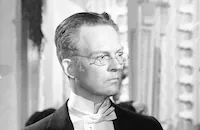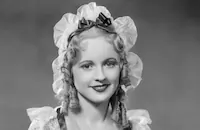Young As You Feel
Cast & Crew
Frank Borzage
Will Rogers
Fifi D'orsay
Lucien Littlefield
Donald Dillaway
Terrance Ray
Film Details
Technical Specs

Synopsis
Lemuel Morehouse, the owner of a profitable meatpacking company in Chicago, bemoans the fact that neither of his two sons have the time nor inclination to eat with him. Billy is obsessed with culture, while Tom is a physical fitness nut. At the office, Lemuel is exasperated when Billy arrives for work at four in the afternoon and cannot stay because of a party he is giving that night to unveil a statue he bought for $20,000. Lemuel then finds Tom meeting with his golf committee rather than working. When the boys argue that business is only a means to an end, and that happiness and enjoyment of life are desired goals, Lemuel counters their contentions by declaring that what they really need are wives and tells them that Dorothy and Rose Gregson, the daughters of an old friend, will soon be visiting. During the party, Fleurette, a French singer hired by Billy, goes to Lemuel's bedroom to undress before her performance, and after an embarrassing moment, she and Lemuel become friends. She encourages him to loosen up, and after awhile, he saunters downstairs drunk, just as the statue, supposedly a distinguished work of modern art, is being unveiled. Billy worries that Fleurette may be a blackmailer. Sometime later, Billy, Tom and Lemuel's staid partner, Noah Marley, are concerned because Lemuel has not shown up for an important meeting. Since meeting Fleurette, Lemuel is never at home, and he has been arrested in a speakeasy raid. Lemuel arrives at the office in top hat and tails, and when his sons act indignant at his behavior, he reiterates their own philosophy and leaves skipping with Fleurette to go to the races. Billy and Tom call detectives to follow them. At the track, the detectives spy Fleurette introduce Lemuel to Harry Lamson, an infamous blackmailer, but they conclude that she is worth the money it will cost Lemuel. Fleurette tells Lemuel that Lamson is a friend of the man who sold Billy the statue, Colonel Stanhope, and that Stanhope went to Colorado, where her mother owns some land. Lemuel agrees to go with her to check on the land, and Billy and Tom, believing that they left to get married, follow with Marley, the Gregson sisters, who have just arrived in town, the detectives and a judge. At the Hotel Colorado, a suspicious man watches as Lemuel and Fleurette register. When Stanhope boasts that he sold Fleurette's mother's land for $2,000, Lemuel reveals that he has learned that Stanhope made $40,000 from the deal. Lemuel then asserts that the statue Billy bought was in reality a hunk of granite that a drunkard ordered for a tombstone. By warning Stanhope that, as an ex-convict, he could get a ten-year sentence for fraud, Lemuel induces him to pay $40,000 for a large rock he unveils in a ceremony in the hotel lobby. In her bedroom, as Fleurette embraces Lemuel to thank him, the man who earlier spied upon them bursts in and reveals that he is Fleurette's husband. Lemuel is certain that the couple will blackmail him, but thinks the experience has been worth it and takes out his checkbook. Fleurette, disappointed in Lemuel, explains that she left her husband because of his jealousy, and the husband contends that her mother sent for him to check on the land. Convinced that they are telling the truth, Lemuel says that he and Fleurette are not in love, but just good pals. As they shake hands, Lemuel's sons and their party intrude. Lemuel explains that he wanted to teach his sons a lesson, but that he learned one himself: that anyone is dead who lets life pass him by. He then goes on an ocean liner to Paris with Fleurette and her husband, and brings along Marley, who soon sports a toupee and an entourage of attractive young women. The toupee, however, falls into the water, and everyone laughs.

Director

Frank Borzage
Cast

Will Rogers
Fifi D'orsay

Lucien Littlefield

Donald Dillaway
Terrance Ray

Lucile Brown
Rosalie Roy

Gregory Gaye
John T. Murray

Brandon Hurst

C. Henry Gordon
Marcia Harris
Otto Hoffman

Joan Standing
Crew
Don Anderson
Frank Borzage
Lew Borzage
Edwin Burke
Margaret Clancy
George P. Costello
Wm. Fox
James F. Hanley
Alex Kahle
Chester Lyons
Robert Mack
Jack Schulze
John Van Wormer
Sophie Wachner

Film Details
Technical Specs

Quotes
Trivia
Notes
The working titles for this film were Father and the Boys and Cure for the Blues. According to information in the Twentieth Century-Fox Produced Scripts Collection at the UCLA Theater Arts Library, Don Marquis contributed a plot suggestion, and Philip Klein and Barry Conners wrote an outline and a treatment; it is not known if material from these sources was included in the final film. The New York Times reviewer noted, "As in some of his previous films, Mr. Rogers occasionally forgets his lines, but he nevertheless succeeds in adding something that causes them to be just as effective."












